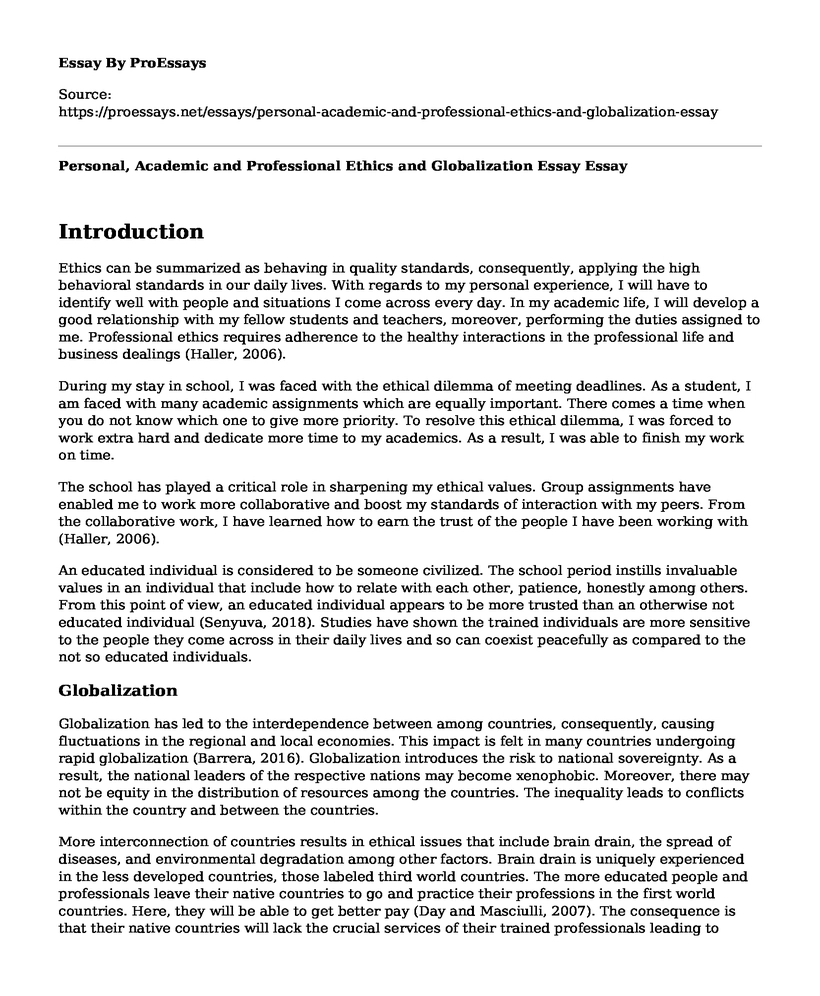Introduction
Ethics can be summarized as behaving in quality standards, consequently, applying the high behavioral standards in our daily lives. With regards to my personal experience, I will have to identify well with people and situations I come across every day. In my academic life, I will develop a good relationship with my fellow students and teachers, moreover, performing the duties assigned to me. Professional ethics requires adherence to the healthy interactions in the professional life and business dealings (Haller, 2006).
During my stay in school, I was faced with the ethical dilemma of meeting deadlines. As a student, I am faced with many academic assignments which are equally important. There comes a time when you do not know which one to give more priority. To resolve this ethical dilemma, I was forced to work extra hard and dedicate more time to my academics. As a result, I was able to finish my work on time.
The school has played a critical role in sharpening my ethical values. Group assignments have enabled me to work more collaborative and boost my standards of interaction with my peers. From the collaborative work, I have learned how to earn the trust of the people I have been working with (Haller, 2006).
An educated individual is considered to be someone civilized. The school period instills invaluable values in an individual that include how to relate with each other, patience, honestly among others. From this point of view, an educated individual appears to be more trusted than an otherwise not educated individual (Senyuva, 2018). Studies have shown the trained individuals are more sensitive to the people they come across in their daily lives and so can coexist peacefully as compared to the not so educated individuals.
Globalization
Globalization has led to the interdependence between among countries, consequently, causing fluctuations in the regional and local economies. This impact is felt in many countries undergoing rapid globalization (Barrera, 2016). Globalization introduces the risk to national sovereignty. As a result, the national leaders of the respective nations may become xenophobic. Moreover, there may not be equity in the distribution of resources among the countries. The inequality leads to conflicts within the country and between the countries.
More interconnection of countries results in ethical issues that include brain drain, the spread of diseases, and environmental degradation among other factors. Brain drain is uniquely experienced in the less developed countries, those labeled third world countries. The more educated people and professionals leave their native countries to go and practice their professions in the first world countries. Here, they will be able to get better pay (Day and Masciulli, 2007). The consequence is that their native countries will lack the crucial services of their trained professionals leading to underdevelopment. Globalization may compromise the health status of nations as it has enabled people to move freely and fast between countries. Swine flu and HIV are some diseases spread through air travel.
Some of the proposed solutions to curb the ethical dilemmas as a result of globalization include the national government taking the interests of the locally educated professionals to heart. For instance, creating a conducive environment where they will comfortably practice their profession. This is in addition to increasing the pay of the professionals. Moreover, there should be strict monitoring and screening of individuals at the ports of entry into a country to ensure there are no foreign diseases introduced into the country.
References
Barrera, A. (2016). Globalization and economic ethics. [Place of publication not identified]: Palgrave Macmillan.
Day, R. and Masciulli, J. (2007). Globalization and political ethics. Leiden: Brill.
Haller, L. (2006). Professional Ethics and Personal Integrity: Report from the International Conference on Legal Ethics, Auckland, New Zealand. Legal Ethics, 9(1), pp.13-15.
Senyuva, E. (2018). Intergenerational differences in the personal and professional values of nurses. Nursing Ethics, p.096973301878468.
Cite this page
Personal, Academic and Professional Ethics and Globalization Essay. (2022, Jul 03). Retrieved from https://proessays.net/essays/personal-academic-and-professional-ethics-and-globalization-essay
If you are the original author of this essay and no longer wish to have it published on the ProEssays website, please click below to request its removal:
- The Matrix Between Descartes and Plato - Compare and Contrast Essay Sample
- High School Administrator and Educator Support for LGBTQ Youth: Literature Review
- Globalization of Sugar in the New Era Essay
- Essay Example on Employees Struggle to Balance Work and Personal Life
- Early Childhood Education: Growth & Development for Kids - Essay Sample
- Effective Performance Appraisal Systems - Essay Sample
- Paper Example on Researching Childhood Depression: Causes & Treatment







